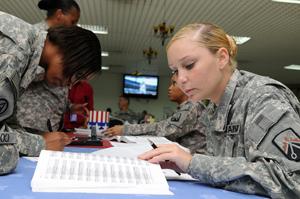West Point professor says centrists outnumber partisans in U.S. military
Ashantas Cornelius (left) fills out her absentee ballot form while Crystal Miller looks for her city’s mailing address during a voting assistance drive in 2008. ( Photo by Dustin Senger via the U.S. Army.)
Polls show that Mitt Romney has maintained a significant edge with veteran voters, but West Point professor Heidi Urben says many soldiers are less conservative than they’re typically portrayed.
Urben studied the attitudes of the officer corps and found about 60 percent said they identify with the Republican Party.
“That’s typically the sound bite that you hear anecdotally or in popular news accounts and that’s been fairly steady over time,” she said. “But when you dig a little deeper you see there’s a more complex story there.”
Urben found that a majority of those who called themselves Republicans were more centrist than they were partisan. She said they lacked strong partisan attitudes.
“Most are weak partisans or independents,” she said. “That’s something you don’t hear reported as much.”
That may be because of the culture of the U.S. military, which drills a non-political ethos into soldiers and discourages partisan political activity.
Jason Dempsey, an Army officer who served in Afghanistan and Iraq, says the military has never been a place where politics are openly discussed or promoted. He says he’s grown frustrated with the way he sees the media portray the military.
“The view of the military as partisan or active politically never matched my experience, my day-to-day experience in the Army,” he said. “Election days come and go and you may or may not notice it.”
Dempsey decided to do his own research on the opinions of soldiers, documented in his book, “Our Army.” He found that rank-and-file soldiers voted at lower rates than civilians. Voting rates are higher among officers, he says, but officers make up a much smaller portion of the military.
“The majority of the military is made up of young men: the 18 to 25-year-old demographic,” Dempsey said. “There’s a lot of things that young men in that age group are passionate about. Politics isn’t one of them.”
But has a decade of war somehow altered political attitudes or behavior in the military?
Urben says the answer is no. Soldiers leave the military with nearly the same views they have going in. About 70 percent of officers she studied reported no change in party affiliation.
“Attitudes within the officer corps are very stable and are formed relatively early in life,” Urben said.
It would be absurd to say that serving in the armed forces during wartime doesn’t change a person. But according to Urben’s research, it seems campaign managers face a stiff challenge in getting military voters to change their political opinions.
